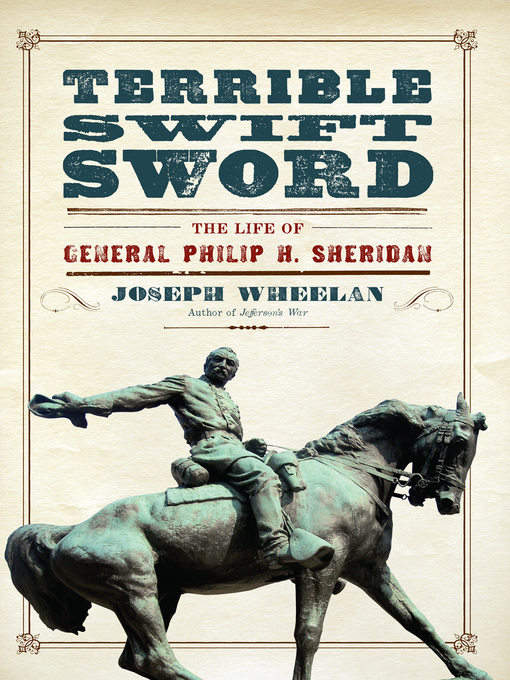After the war, Sheridan ruthlessly suppressed the raiding Plains Indians much as he had the Confederates, by killing warriors and burning villages, but he also defended reservation Indians from corrupt agents and contractors. Sheridan, an enthusiastic hunter and conservationist, later ordered the US cavalry to occupy and operate Yellowstone National Park to safeguard it from commercial exploitation.
-
Creators
-
Publisher
-
Release date
August 7, 2012 -
Formats
-
Kindle Book
-
OverDrive Read
- ISBN: 9780306821097
-
EPUB ebook
- ISBN: 9780306821097
- File size: 2751 KB
-
-
Languages
- English
-
Reviews
-
Publisher's Weekly
May 21, 2012
Former AP reporter and editor Wheelan (Jefferson’s War), like all biographers of Sheridan (1831–1888), is handicapped by the destruction of the general’s papers in the Chicago fire of 1871. He nevertheless makes solid use of published material in this presentation of a commander whose ruthless approach made him an early advocate of total war. Wheelan describes Sheridan as willing to leave enemies, whether Confederates or Plains Indians, “nothing but their eyes to weep with” (as the general told Otto von Bismarck), He was no less willing to defend “what he believed needed protecting,” whether black freedmen, surrendered tribesmen, or law-abiding former. Confederates. And Sheridan shone in combat. As a leader he inspired soldiers in the throes of defeat—most notably at Cedar Creek in the Shenandoah Valley. As an organizer, he brought the Army of the Potomac’s cavalry from a bedraggled auxiliary to a battle-winning force that combined fire and shock in a way unmatched until Germany’s panzer divisions. As a tactician, he was uniquely successful in coordinating infantry, cavalry, and artillery. Above all, as Wheelan shows, Sheridan’s aggressiveness remains a basic principle of U.S. war making and continues to inspire “imitators and innovators” alike. 16 pages of b&w photos. Agent: Roger Williams, New England Publishing Associates. -
Kirkus
July 1, 2012
A former reporter and AP editor examines the career of one of the Civil War's great commanders. An undistinguished West Point graduate, Lt. Philip A. Sheridan served eight years in the west before the outbreak of the Civil War. By the time the war ended, only Grant and Sherman outranked "Little Phil." Battle by battle, Wheelan (Libby Prison Breakout: The Daring Escape from the Notorious Civil War Prison, 2010, etc.) charts the swift rise of the relentlessly aggressive Sheridan. Modest, energetic and brave, Sheridan was an innovator, using mounted troops both as an independent strike force and in support of infantry operations. His battlefield heroics, careful planning, use of intelligence and topographical information, and ability to improvise prompted Grant to conclude that he had "no superior as a general." Yet Sheridan has been slighted by historians, receiving far less attention than his adversaries and even his subordinate Custer or his postwar scout William Cody. Wheelan attributes this neglect to the loss of all Sheridan's papers in the Great Chicago Fire of 1871. Perhaps, but it's also likely that his lengthy postwar career has made him a problematic subject for modern audiences. Sheridan was reviled in the South, where his strict enforcement of Reconstruction only revived memories of his wartime devastation of the Shenandoah Valley. An early proponent of total war, he believed reducing the Confederacy to poverty was the quickest way to end the bloodshed. Moreover, as commander of all U.S. troops west of the Mississippi, he used the same tactics against the Plains Indians, once notoriously remarking, "The only good Indians I ever saw were dead." Wheelan ably defends Sheridan, emphasizing the fierce sense of duty that also accounted for his stout protection of reservation Indians from rapacious agents, freedmen from ex-Rebels, settlers from Indians and Yellowstone National Park from poachers and corporate exploiters. A sympathetic portrait of "Grant's most dependable troubleshooter."COPYRIGHT(2012) Kirkus Reviews, ALL RIGHTS RESERVED.
-
Formats
- Kindle Book
- OverDrive Read
- EPUB ebook
Languages
- English
Loading
Why is availability limited?
×Availability can change throughout the month based on the library's budget. You can still place a hold on the title, and your hold will be automatically filled as soon as the title is available again.
The Kindle Book format for this title is not supported on:
×Read-along ebook
×The OverDrive Read format of this ebook has professional narration that plays while you read in your browser. Learn more here.


